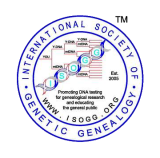Before You Buy
From ISOGG Wiki
This guide provides advice on some points to consider before you buy a DNA test.
- Clarify your goals. What do you hope to learn from a DNA test? Which DNA test(s) should you or your relatives take to address your questions? Consult the beginners' guides to genetic genealogy for more insights. Don't hesitate to seek advice about your specific scenario on some of the genetic genealogy mailing lists. The DNA-NEWBIE list is a good place to start.
- You may need to lower your expectations a bit. DNA is a "novel, objective, and independent form of evidence,"[1] yet uncertainties may remain. The nomenclature or the interpretation of your results may change over time. Each type of DNA test has its limitations. You may not have an immediate match in a Y chromosome or mtDNA database. Your haplogroup may not tell you exactly where your paternal or maternal line originated. Autosomal DNA tests may not identify a known fourth cousin or break down that brick wall. Admixture percentages may show inconsistencies from company to company and fail to detect small components of your ancestry. In spite of all those caveats, success stories do abound.
- Ask yourself if you really want to know. A DNA test can sometimes provide surprising results, which might challenge your sense of ethnic identity, contradict your laborious genealogical research, or reveal unsuspected relationships. Your results may have an impact on your family members as well. You are your own best judge of your ability to handle the unexpected.
- Do some comparison shopping. See the list of DNA testing companies, which also has links to side-by-side comparison charts for different types of tests.
Further reading
- Hacking your DNA? Some things to consider before buying a DNA test online by Andelka M Phillips. Health Law Blog Sweden, 27 February 2024.
- Read this before you buy a genetic testing kit by Catherine Roberts, Consumer Reports, 2 February 2021.
- Read the fine print by Judy Russell, The Legal Genealogist, 11 December 2016.
See also
Footnotes
- ↑ Megan Smolenyak and Ann Turner. Trace Your Roots with DNA: Using Genetic Tests to Explore Your Family Tree. Rodale Books, 2004, page 57
